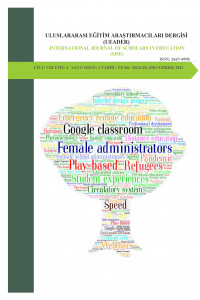Araştırma Makalesi
Diğer
Amaç ve Kapsam
Uluslararası Eğitim Araştırmacıları Dergisi (UEADER), eğitim bilimleri alanında yapılan özgün çalışmaların yayımlandığı ücretsiz bilimsel bir dergidir. UEADER'in yayım hayatında olmasında iki amacımız bulunmaktadır. İlk amacımız; alanda çalışan bilim insanlarının özgün çalışmaları doğrultusunda alana katkı sunmaktır. İkinci amacımız ise sahada çalışan paydaşların özgün uygulama ve uyarlamaları doğrultusunda sahaya katkı sağlamaktır. UEADER, haziran ve aralık ayında olmak üzere yılda iki kez yayın yapmaktadır. Tüm çalışmaların değerlendirilmesi kör hakemler tarafından yapılmaktadır ki bu sistemle yazarlar ve hakemler birbirleri hakkında hiç bir bilgiye ulaşamamaktadırlar. Bu şekilde, makale değerlendirmelerinin daha objektif olması sağlanmaktadır.
Eğitimin her alanında yapılmış çalışmalar Uluslararası Eğitim
Araştırmacıları Dergisi (UEADER) kapsamındadır.
Yazım Kuralları
UEADER, hiç bir şekilde, makale yükleme, yayınlama veya hakem süreçlerinde para talep etmemektedir.
Dergiye gönderilen makaleler APA 6 veya APA 7 kurallarına göre yazılmış olmalıdır.
APA 6'ya göre kaynakça örnekleri için lütfen tıklayınız
Etik İlkeler ve Yayın Politikası
Uluslararası Eğitim Araştırmacıları Dergisi makale kabulü ve yayımında etik kurallara uyar. Bu kapsamda makale kabulü için öncellikle intihal açısından makale
iThenticate programı ile incelenir. Yüzde 20'den daha fazla alıntı ve başka yayımlarla örtüşen ancak atıf verilmeyen makaleler hakem sürecine alınmaz.
Ayrıca;
Uluslararası Eğitim Araştırmacıları Dergisi:
1. Yüksek Öğretim Kurulu’nun belirlediği şu kuralları uyar:
Bilimsel Araştırma ve Yayın Etiğine Aykırı Eylemler
Madde 4 - (1) Bilimsel araştırma ve yayın etiğine aykırı eylemler şunlardır:
a) İntihal: Başkalarının özgün fikirlerini, metotlarını, verilerini veya eserlerini bilimsel kurallara uygun biçimde atıf yapmadan kısmen veya tamamen kendi eseri gibi göstermek,
b) Sahtecilik: Bilimsel araştırmalarda gerçekte var olmayan veya tahrif edilmiş verileri kullanmak,
c) Çarpıtma: Araştırma kayıtları veya elde edilen verileri tahrif etmek, araştırmada kullanılmayan cihaz veya materyalleri kullanılmış gibi göstermek, destek alınan kişi ve kuruluşların çıkarları doğrultusunda araştırma sonuçlarını tahrif etmek veya şekillendirmek,
ç) Tekrar yayım: Mükerrer yayınlarını akademik atama ve yükselmelerde ayrı yayınlar olarak sunmak,
d) Dilimleme: Bir araştırmanın sonuçlarını, araştırmanın bütünlüğünü bozacak şekilde ve uygun olmayan biçimde parçalara ayırıp birden fazla sayıda yayımlayarak bu yayınları akademik atama ve yükselmelerde ayrı yayınlar olarak sunmak,
e) Haksız yazarlık: Aktif katkısı olmayan kişileri yazarlar arasına dâhil etmek veya olan kişileri dâhil etmemek, yazar sıralamasını gerekçesiz ve uygun olmayan bir biçimde değiştirmek, aktif katkısı olanların isimlerini sonraki baskılarda eserden çıkartmak, aktif katkısı olmadığı halde nüfuzunu kullanarak ismini yazarlar arasına dâhil ettirmek,
(2) Diğer etik ihlal türleri şunlardır:
a) Destek alınarak yürütülen araştırmalar sonucu yapılan yayınlarda destek veren kişi, kurum veya kuruluşlar ile bunların katkılarını belirtmemek,
b) Henüz sunulmamış veya savunularak kabul edilmemiş tez veya çalışmaları, sahibinin izni olmadan kaynak olarak kullanmak,
c) İnsan ve hayvanlar üzerinde yapılan araştırmalarda etik kurallara uymamak, yayınlarında hasta haklarına saygı göstermemek,
ç) İnsanlarla ilgili biyomedikal araştırmalarda ve diğer klinik araştırmalarda ilgili mevzuat hükümlerine aykırı davranmak,
d) İncelemek üzere görevlendirildiği bir eserde yer alan bilgileri eser sahibinin açık izni olmaksızın yayımlanmadan önce başkalarıyla paylaşmak,
e) Bilimsel araştırma için sağlanan veya ayrılan kaynakları, mekânları, imkânları ve cihazları amaç dışı kullanmak,
f) Dayanaksız, yersiz ve kasıtlı olarak etik ihlal isnadında bulunmak,
g) Bilimsel bir çalışma kapsamında yapılan anket ve tutum araştırmalarında katılımcıların açık rızasını almadan ya da araştırma bir kurumda yapılacaksa ayrıca kurumun iznini almadan elde edilen verileri yayımlamak,
h) Araştırma ve deneylerde, hayvan sağlığına ve ekolojik dengeye zarar vermek,
ı) Araştırma ve deneylerde, çalışmalara başlamadan önce alınması gereken izinleri yetkili birimlerden yazılı olarak almamak.
i) Araştırma ve deneylerde mevzuatın veya Türkiye'nin taraf olduğu uluslararası sözleşmelerin ilgili araştırma ve deneylere dair hükümlerine aykırı çalışmalarda bulunmak.
j) Araştırmacılar ve yetkililerce, yapılan bilimsel araştırma ile ilgili olarak muhtemel zararlı uygulamalar konusunda ilgilileri bilgilendirme ve uyarma yükümlüğüne uymamak,
k) Bilimsel çalışmalarda, diğer kişi ve kurumlardan temin edilen veri ve bilgileri, izin verildiği ölçüde ve şekilde kullanmamak, bu bilgilerin gizliliğine riayet etmemek ve korunmasını sağlamamak,
l) Akademik atama ve yükseltmelerde bilimsel araştırma ve yayınlara ilişkin yanlış veya yanıltıcı beyanda bulunmak,
Bilimsel Araştırma ve Yayın Etiğine Aykırı Olarak Değerlendirilemeyecek Haller
Madde 5 - (1) Bir başkasının özgün üslup ve ifadesinin aynen kullanmamak şartıyla, anonim bilgilerin, bilim alanlarının temel bilgilerinin, matematik teoremleri ve ispatları gibi önermelerin çalışmalarda kullanılması etik ihlal olarak değerlendirilemez.
2. Uluslararası Eğitim Araştırmacıları Dergisi (UADER) ayrıca Committee on Publication Ethics'in (COPE) Yayın Etiği yönergelerini kabul etmekte ve uygulamaktadır:
ULUSLARARASI EĞİTİM ARAŞTIRMACILARI DERGİSİ'ne (UEADER) yayın gönderen yazarlar aşağıdaki kurallara uymalıdır:
Gönderilen makaleler, yazar(lar)ın özgün çalışması olmalıdır.
Gönderilen makaleler daha önce yayınlanmamış olmalıdır.
Bir makalenin eşzamanlı olarak birden fazla dergiye yayınlanmak üzere gönderilmesi etik değildir.
Olası herhangi bir çıkar çatışması açıkça belirtilmelidir.
Makalenin geliştirilmesinde kullanılan veri kaynakları hakkında Uluslararası Eğıtim Araştırmacıları Dergisi (UEADER) bilgilendirilmelidir.
Makale yayınlanmak üzere yollandıktan sonra yazar tarafından herhangi bir hata bulunursa, yazar (lar) yapılan düzeltmeleri derhal Editöre bildirmelidir(ler).
ULUSLARARASI EĞİTİM ARAŞTIRMACILARI DERGİSİ'nin (UEADER) hakemleri aşağıdaki kurallara uymalıdır:
Bütün makaleleri, makalenin entelektüel içeriğini temel alarak, yazarın cinsiyet, ırk, etnisite, din, vatandaşlık veya siyasi değerlerine bakmaksızın adil şekilde değerlendirmelidirler.
Değerlendirmelerini, düşmanca veya kışkırtıcı olmaktan uzak, ürkütücü veya küçümseyici kişisel yorumlar yapmaktan kaçınacak şekilde objektif ve yapıcı yapmalıdırlar.
Doğru bir değerlendirme yapmak için gereken uzmanlık yeterliliğine sahiptirler ve makaleleri kendilerine verilen süre içinde değerlendirirler.
Gözden geçirme işlemi sırasında çıkar çatışması gözlemliyorlarsa, durumu Editör'e bildirmelidirler.
Makaleyle ilgili tüm bilgileri gizli tutmalıdırlar.
Değerlendirme süreci sırasında elde ettikleri bilgileri, kendi veya başkalarının veya başka kuruluşların avantajına veya başkalarını dezavantajlı duruma düşürmek veya itibarını zayıflatmak için kullanamazlar.
Makalenin yayınlanmasının reddine neden olabilecek herhangi bir bilgi varsa Editöre bildirmelidirler.
ULUSLARARASI EĞİTİM ARAŞTIRMACILARI DERGİSİ'nin (UEADER) editörleri aşağıdaki kurallara uymalıdır:
Bütün makaleleri, makalenin entelektüel içeriğini temel alarak, yazarın cinsiyet, ırk, etnisite, din, vatandaşlık veya siyasi değerlerine bakmaksızın adil şekilde değerlendirmelidirler.
Makaleler ile ilgili bilgileri gizli tutmalıdırlar.
Makaleler ile ilgili herhangi bir çıkar çatışması gözlemledilerse, bunları açıklanmalıdırlar.
Yayın Kurulu, yayınlanmak üzere gönderilen makalenin hakem değerlendirmelerine dayalı olarak yayınlanması kararının verilmesinden, derginin yayın kurulu politikalarından ve intihal, hakaret ve telif hakkı ihlaline karşı yasal tedbirlerin alınmasından sorumludur.
COPE'in yayın etiği yönergesine ulaşmak lütfen tıklayınız
Ücret Politikası
Uluslararası Eğitim Araştırmacıları Dergisi ücretsiz bir dergidir. Makale göndermek, yayımlamak ve okumak tamamen ücretsizdir. Makale gönderim (APC) vb. altında herhangi bir ücret talep edilmemektedir.
Dizinler
Atıf Dizinleri
Diğer Dizinler
Dergi Kurulları
Editor in Chief

Editorial Board






































